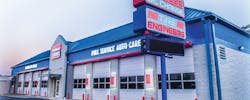In America, it is common to super size our meals and, unfortunately, the waistline in the process, while we also often live by the motto of, “Go big or go home.” When it comes to having a successful shop, it is actually a matter of finding the right size. Expanding can accommodate more business and allow you to offer more services, but a number of other considerations need to be made, too.
More bays means more cars can be handled during the day, and customers who see shorter — or no — lines are more likely to drive in for service. But before figuring out which wall to tear down, there are factors that should be addressed.
“Adding a bay is an expensive and disrupting event and shouldn’t be considered unless all other aspects of increasing business have been exhausted first,” said Oilstop Inc. president Larry Dahl.
“If the site is well-located, many other avenues can be taken to increase car count,” Dahl said. “We have several two-bay stores that are exceeding 45 cars/day and are continuing to grow.”
Yet, those shops that are seeing business literally driving away could see an increase in business with new bays, but must first go over some key factors.
Before expanding the size any of its locations Oilstop gives consideration to the process, and at the top of the list is whether or a new site altogether may make sense. Dahl said there is no sense in adding a bay to an inferior location.
EXPANSION CHECKLIST
Once a shop determines that an expansion is the right course of action, there should be a thorough checklist of considerations to make, too.Topping the list for any shop should be analyzing whether the existing bays can be made more efficient to handle more vehicles. From there, the question of whether more bays will generate more income should be addressed — do the population and income numbers, as well as traffic patterns and major retail support, justify the desire for the expansion.
In addition, while a full-blown environmental impact study may not be required, shop owners should consider whether the entrance and exit can handle the increased traffic. No one is likely to return to a shop that is hard to get into or, worse, leave!
Finally, during the checklist stage, there is the issue of whether the time — not to mention the costs — involved in an expansion can be justified. Shops should think about the lost revenue that will come with any construction.
“Even a modest renovation could mean tearing down a wall or two,” warned Stephen Barram, CEO of Integrated Services, Inc., a supplier of modular bay systems. “Any construction is going to be disruptive to business.”
GOING BIG
For Chris Nonnemann, owner of Express Oil Change in Troy, Alabama, an expansion had been in the cards for a number of years. He had started the business in 1996 and has owned it through a number of branding changes, but along the way, he knew the shop should have been bigger.In fact, Nonnemann had plans to increase the size of his shop more than a decade ago, but everything was put on hold when his father passed away in 2005. Nonnemann’s father had actually been the contractor of the building when it was constructed back in 1995, and despite considerations for shop growth, it didn’t take long for it to be at maximum capacity.
“We used all the available space, and we wished it had been larger,” Nonnemann said. “Part of the reason is when we opened the shop in 1996, there was no other quick lube shop in town, and now, 21 years later, we are still the only game around.”
Part of the original thinking of expanding was to block competition from coming to town, and then there was the consideration about expanding to a second location. In the end, a bigger shop seemed to be the best course of action.
“We have a solid customer base that we built over two decades, and we saw that when lines are long, people leave and come back later,” Nonnemann added. “That told us we could expand just with oil changes. But on any given day in our two-bay shop, we’d have people ask to check the brakes, look at the A/C and even ask questions about the transmission. We were sending that business away.”
Clearly, the shop had an opportunity to grow, and earlier this year, the Express Oil Change-branded shop expanded from two bays that primarily were focused on oil changes to a full-service shop.
“For us, it did work out, and we were able to remain open throughout the construction, except for the day when asphalt was put in front of the business, and that required us closing for a couple of hours,” Nonnemann explained. “We did very well as we had no rain, and there isn’t a lot of cold weather down here in Alabama. It was about a six-month process.”
In this particular case, the shop was able to utilize the oil change bays immediately while they waited for the equipment to be installed in the mechanical bays. One benefit of the expansion was, this also allowed the older bays to be repaired and updated.
GOING DEEP
If there is one concern that many shops have when considering an upgrade, it is the process of installing new pits, and for Nonnenmann that was a headache in more ways than one.“We had to build a basement next to the existing basement and that meant the progress seemed slow,” he added. “But what was worse was the noise. The customers didn’t like it, and the employees had to wear earplugs.”
This is where zip pits and other modular solutions allow expansion without digging pits. This can also allow a shop to expand slowly and see if the business is really there.
“From a modular standpoint, this is less invasive, but as a modest renovation, we’ve seen shops that set up an extra bay that is in a semi-permanent structure like an all-weather canopy,” Barram said. “It can allow for various services and still provide a way to drive through.”
Even in a larger building expansion, the zip pits, which are built off-site and can be installed in one to two days, offer a way to add a bay and expand services, too.
“A pit with lifts allows you to do everything you need to do in a pit and a bit more,” Barram said. “These can be used to do brakes and transmission, but we really see that it has the benefit of not having to dig a basement, which can increase the costs. A modular solution can also mean there are fewer days of business interruption, which is really crucial because many guys determine the costs of the expansion but forget to calculate the money that is lost when you’re shop is down.”
About the Author

Peter Suciu
Peter Suciu is Michigan-based writer and NOLN freelance contributor who has contributed to more than four dozen magazines, newspapers and websites. He lives in the land of cars not far from one of Henry Ford's estates.
